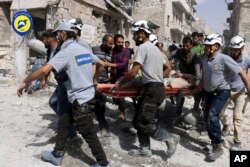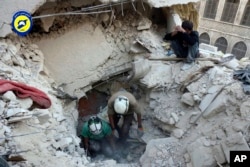Russia on Saturday vetoed a draft U.N. Security Council resolution seeking to end the deadly bombing of Aleppo, Syria.
It was the fifth time in five years that Moscow has used its veto to block U.N. action aimed at stopping the bloodshed.
"The regime and its supporters claim to be acting in the context of combating terrorism," said French Foreign Minister Jean-Marc Ayrault, who flew to New York for the rare Saturday vote.
"This is totally false and I strongly condemn it. [Syrian President] Bashar al-Assad is not combating terrorism; he is fueling it," the minister said.
France and Spain drafted the text, which was co-sponsored by nearly 50 countries.
Russia vetoed, China abstained
Ayrault had spent the previous three days conducting shuttle diplomacy, going first to Moscow and then Washington, to see whether he could win support for the measure from the two capitals after the U.S. suspended bilateral cooperation with Russia on Syria.
Without the Russian veto, the measure would have passed. China and Angola abstained and Venezuela joined Russia in voting no, but 11 council members voted in favor.
"Russia and Assad want to seize eastern Aleppo to further bolster the regime in Damascus. Russia could not let this resolution stand in their way, so they vetoed it," said Deputy U.S. Ambassador David Pressman.
"Russia dropped its veto here in the Security Council to strengthen Bashar al-Assad at the expense of 275,000 Syrians," he added. That is how many people the United Nations say are besieged in the rebel-held part of the city.
Safe access for aid also rejected
The text sought immediate implementation of the cessation of hostilities that fell apart last month, including the demand that all parties "immediately end all aerial bombardments of and military flights over Aleppo city."
Only the Syrian government and its close ally Russia have warplanes in the air over Aleppo.
The resolution also sought to demand safe and unhindered humanitarian access throughout Syria.
Russia's ambassador bristled at the idea of a resolution telling a permanent council member to limit its activities without its prior agreement.
Rival resolution
In a second vote, the council soundly defeated a rival resolution drafted by Russia that was only circulated to council members late Friday.
The text urged the immediate implementation of the cessation of hostilities but did not call for a halt to the bombings that Russia's military is participating in.
Only four of the 15 council members supported the measure: Russia, China, Egypt and Venezuela. Angola and Uruguay abstained, while the rest of the council voted against.
"Our draft today — which, as I said, we weren't expecting it would be adopted, it was just a political demonstration, if you like — it was attempting to retain the multilateral format," said Russian envoy Vitaly Churkin.
Some council members complained that the timing of the resolution did not allow for any discussion or negotiation, as is customary. Others said it was imbalanced and did not go far enough.
"This text was a cynical attempt to divert attention from your veto today that once again denied any hope to the people of Aleppo," British U.N. Ambassador Matthew Rycroft said.
"It failed because it failed to demand an immediate end to the aerial bombardment of Aleppo. It's a sham, just as Russia's hollow commitment to a political process in Syria is a sham," he added.
US: Stop the slaughter
"This text was a deceptive attempt to get the Security Council to ratify what Russia and the regime are doing in Aleppo," the American envoy said. "What Russia wants is for there to be more talk, while they seek to take the city by brutal force. What we want is less talk and more action for them to stop the slaughter."
Earlier this week, U.N. Syria envoy Staffan de Mistura warned that if the bombing continued at the current rate, Aleppo might be destroyed by the end of the year. He appealed to the Security Council to act.
The United States and its European allies have been trying to isolate Russia over its actions in Syria, suggesting that they could impose sanctions and calling for war crimes investigations.






